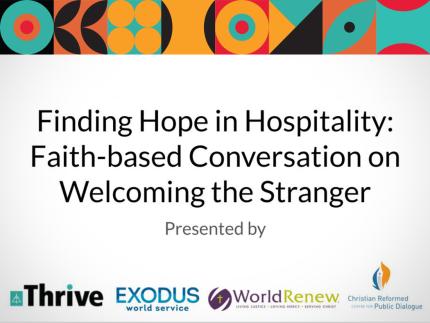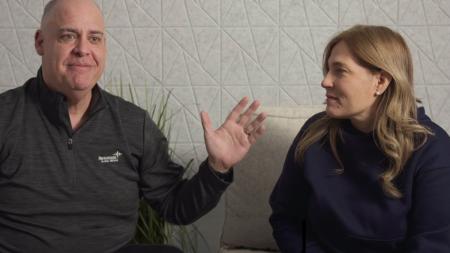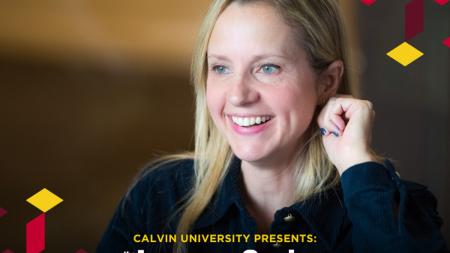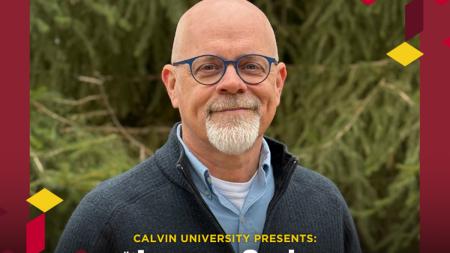Finding Hope in Hospitality

A recent online gathering of CRC congregants and ministry leaders offered an opportunity to reflect on what it means to extend a welcome in the name of Christ. Finding Hope in Hospitality: A Faith-Based Conversation on Welcoming the Stranger brought together over 90 registrants from the U.S. and Canada, with 65 attending live and all receiving additional follow-up resources and opportunities.
Hosted by Thrive, World Renew, and the Centre for Public Dialogue in partnership with Exodus World Service, the event explored faithful responses to refugee resettlement, labor migration, and biblical hospitality. Participants were invited to consider how their congregations might deepen their engagement with newcomers in their communities.
For many, the conversation was both encouraging and eye-opening.
“I was encouraged by the discussion it prompted,” said Rev. David Zigterman, pastor of Emden CRC in Renville, Minn. “One of the people at our table was surprised to learn about both the sheer number of refugees and that most refugees are women and children. Emden wants to be a welcoming place for refugees. There’s a lot of migratory labor in the area, and we’ve struggled with how to reach and welcome them.”
That tension between desire and capacity – knowing what Scripture calls for and knowing how to engage – was a key theme. The event included reflections on the biblical call to love the stranger, stories of churches already engaged in refugee resettlement, and updates on current policies and opportunities to sponsor or support displaced families.
For Cherri Le Forestier of Hebron CRC in Whitby, Ont., the event offered clarity, inspiration, and practical knowledge.
“I appreciated receiving clarity about some topics, such as making a refugee claim in Canada when you are already in the country,” she shared. “And I appreciated spending time in the Scriptures that help us answer questions about why we sponsor refugees. In the parable of the good Samaritan, the one who was a neighbor to the injured man was the one who had mercy on him. Jesus says, ‘Go and do likewise.’ [Luke 10:37]”
Hebron CRC has a long history of refugee sponsorship, having welcomed newcomers since 1979. Even so, Le Forestier noted that the event introduced new information, such as the Migration of Workers report adopted by Synod 2010, a resource that outlines key recommendations for church engagement with migrants and laborers.
With three refugee sponsorships currently in process, she said, her church is discerning whether to begin a fourth. “This conversation provided resources for us to use and encouragement to continue,” she said.
The format of the event encouraged cross-border dialogue and sharing. Attendees heard from presenters as well as one another, learning from diverse congregational experiences. Jill Feikema, vice president of the CRCNA U.S. Ministry Board and outgoing chair of the Council of Delegates Committee for Resonate Global Mission, said she appreciated that diversity.
“I loved the variety of people who participated and [hearing] from so many across the U.S. and Canada who are doing very different ministries to welcome the stranger in our midst,” said Feikema, who worships at New Hope Church in Lansing, Ill. “From doing classes for ESL learners to helping people settle in their communities to hosting church planters from diaspora communities, it’s amazing to see how churches are using their resources and abilities in many different ways.”
Feikema said she was especially moved by a moment of shared reflection: “We all, at one time or another, have found ourselves in a place where we didn’t belong but were welcomed with hospitality and kindness. That memory becomes our motivation – recognizing the variety of circumstances that bring people away from our original homelands, and reminding ourselves that even if we can’t fulfill all of someone’s needs, that doesn’t stop us from doing what we can.”
New Hope Church, though small, she added, plays a key role in refugee support by hosting the offices of a local resettlement agency. That steady, behind-the-scenes contribution speaks to a broader truth the event reinforced: that every church, regardless of size or location, can play a part in welcoming refugees.
“It gives us encouragement to see other small churches using their resources of time and funds to support many,” said Feikema.
The event concluded with an invitation to continue the work through sponsorship, advocacy, relationship building, and daily acts of hospitality.
“My hope,” said Le Forestier, “is that we will sponsor many more refugee families because we have learned to see our fellow newcomers as imagebearers of Christ rather than as strangers.”
Feikema echoed that vision. “I hope that we can see this not only as a legal issue but as a role of the church to welcome each other as people created in God’s image from all nations, tribes, and tongues. We have so much to celebrate in our differences. If we can devote regular practices of hospitality in our lives, we too find enrichment and joy.”
As churches continue to wrestle with their role in a rapidly shifting world, this event reminded participants that the call to love the stranger is not just a policy discussion but a gospel imperative, a spiritual practice, and a profound opportunity to witness God’s kingdom unfolding through simple, faithful acts of welcome.
In response to an outpouring of requests, Thrive, World Renew, and the Centre for Public Dialogue plan to continue hosting cross-border webinars and conversations in the coming months toward continuing the CRC’s legacy of welcome to immigrants and refugees of all nations.


